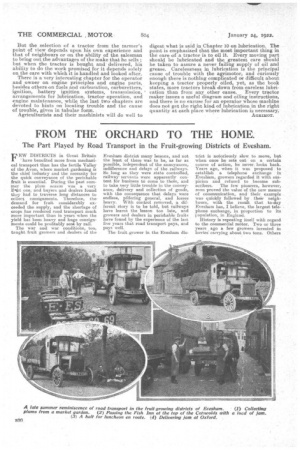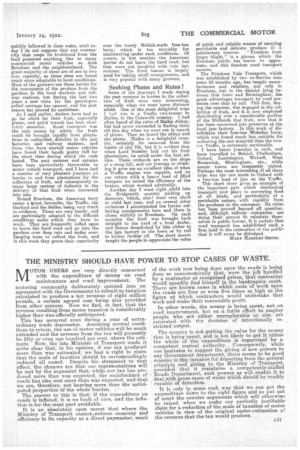FROM THE ORCHARD TO THE• HOME.
Page 26

Page 27

If you've noticed an error in this article please click here to report it so we can fix it.
The Part Piayed by Road Transport in the Fruit-growing Districts of Evesham.
EW DISTRICTS in Great Britain have benefited more from mechanical transport than has the fertile Valley of the Avon, where market gardening 15 the chief industry and the necessity for the quick conveyance of the perishable fruit is essential. During the past summer the plum season was a very If Pi,lat one, and buyers and dealers found they had to traverse long distances to collect consignments. Therefore, the demand for fruit, considerably exceeded the supply, and the shortage of crops has rendered road transport much more important than in years when the yield has been heavy and huge consignments could be profitably sent by rail The war and war conditions, ton, taught fruit growers and dealers of the
Evesham district many lessons, and not the least of these was to be, as far as possible, independent of the annoyances, indifference and delays of the railways. So long as they were state controlled, railway servants were apparently content for business to come to them, and to take very little trouble in the conveyance, delivery and collection of goods, with the consequence that delays were endless, pilfering general, and losses heavy. With control removed, a different story is to be told, but railways have learnt the lesson too late, and growers and dealers in perishable fruits have found by the experience of the last five years that road transport pays, and pays well.
The fruit grower in the Evesham dis
trict is notoriously slow to move, but when once he sets out on a certain course of action, he never, looks back. Years ago, when it was proposed to establish a telephone exchange in Evesham, growers regarded it with suspicion and refused to become sub scribers. The few pioneers, however, soon proved the value of the new means of communication, and their example was quickly followed by their neighbours, with the result that to-day Evesham has, I believe, the largest telephone exchange, in proportion to its population, in England.
History is repeating itself with regard to the commercial motor. Two or three years ago a few growers invested in lorries' carrying about two tons. Others quickly followed in their wake, until today I do not suppose that any community that reaps its livelihood from the land possesses anything like so many commercial motor vehicles as does Evesham and the neighbourhood. The great majority of these are of one to two tons capacity, as these sizes are found much more adaptable to local conditions. Most of the growers use these lorries for the conveyance of the produce from the gardens to the local markets and railway stations, but during the last • two years a new vista for the petrol-propelled carriage has opened, and the past season has proved its usefulness. As I said earlier, dealers have had to go far afield for their fruit, especially plums, and quick transit has been absolutely essential. Road transport was the only means by which the fruit could be brought rapidly from plantations in outlandish districts to the jam factories and railway stations and those who have started motor vehicles have found their hands pretty full for the short time during which the rush lasted. The past summer and autumn have been particularly favourable to motor vehicle transport, and I have had a number of very pleasant journeys on lorries to and from plantations for the collection of fruit, and subsequently to many large centres of industry in the delivery of that fruit when converted into jam.
Round Evesham, the American lorry seems a great favourite, the Traffic, the Garford and the Selden being very much in evidence. These are very handy, and are particularly adapted to the difficult conditions under which they have to work. They are frequently called upon to leave the hard read and go into the gardens over deep ruts and under overhanging trees to collect the fruit, and in this work they prove their superiority
over the heavy British-made four-ton lorry, Wiliet1 is too unwieldy for manceuvring I under such conditions. Of course, in wet weather the American lorries do net leave the hard road, but they were not troubled with rain last summer. The Ford tonner is largely used for taking small consignments, and is very popular with many growers.
Seeking Plums and Ruins!
Some of the journeys I made during the past summer in lorries in the collection of fruit were very interesting, especially when we went some distance afield. One of the most delightful trips I had was in a Traffic two-tonner to Hailes, in the Cotswold country. I had often heard of the ruins of Hailes Abbey, but had never succeeded in finding them till this day when we were out in search of plums. Then we found the abbey and the plums. 'Hailes is a delightful country, certainly far removed from the bustle of city life, but it is evident that when Lord Eludeley laid out his fruit plantations, he acted under the best advice. These orchards are on the slope of a steep hill, and our journey in climbing it gave me an excellent idea of what a Traffic engine was capable, and on our return with a heavy load of filled hampers we tested the efficiency of the brakes, which worked admirably. Another day I went right afield into the Bridgmarth country picking up damsons, which, alas! were very short in yield last year, and on several other occasions I accompanied the lorries collecting consignments here and there in closer vicinity to Evesham. On each occasion the fruit was brought back straight to the yard of a local dealer, and thence despatched by him either to the jam factory in the town or by rail to boilers farther off. The short season taught the people to appreciate the value
of quick and reliable means of carrying perishable and delicate produce in a satisfactory manner. " Freedom from finger blight" is a phrase which the Evesham public has learnt to appreciate, and this freedom road transport assures.
The Evesbam Vale Transport, which was established by two ex-Service men some 18. months ago, has taught manufacturers and retailers, not only in Evesham, but in the district lying between that town and Birmingham, the great advantages transport by road possesses over that by rail. This firm, during the summer, was engaged in the collection of fruit, and it is now employed distributing over a considerable portion of the Midlands that fruit, now that it has been converted into preserves at the local jam factory.. In this work of distribution their four-ton Wolseley lorry, which was found much less suitable for collecting the raw material than the twoion Traffic, is extremely serviceable. I have taken journeys in each, and have travelled to Bristol, Cheltenham, Oxford, Leamington, Walsall, West Bromwich, Birmingham, etc., while nearer towns are frequently visited. Perhaps the most interesting of all these trips was the one made to Oxford with a two-ton load of jam on the Traffic.
This short story gives an example of the important part which mechanical transport now plays in conveying food of all kinds, and particularly of a perishable nature, with rapidity from the producer to the consumer. Its value has been proved beyond all question, and, although railway -companies are doing their utmost to reinstate themselves in public favour, it is certain that road transport has established such a firm hold in the estimation of the public. that it will never be dislodged.
MARY HARTLEY-SMITH.






























